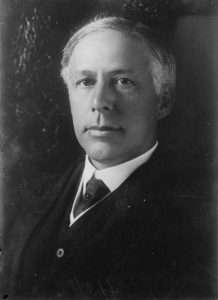The Volokh Conspiracy
Mostly law professors | Sometimes contrarian | Often libertarian | Always independent
Today in Supreme Court History: January 3, 1911
1/3/1911: Justice Willis Van Devanter takes oath.

Editor's Note: We invite comments and request that they be civil and on-topic. We do not moderate or assume any responsibility for comments, which are owned by the readers who post them. Comments do not represent the views of Reason.com or Reason Foundation. We reserve the right to delete any comment for any reason at any time. Comments may only be edited within 5 minutes of posting. Report abuses.
Please to post comments


United States v. Gaskin, 320 U.S. 527 (decided January 3, 1944): "Peonage" (abducting someone in debt to you and forcing him to work for you until the debt is paid off) is a Thirteenth Amendment violation and was outlawed in 1867. Here, where the defendant had "arrested" one James Johnson and transported him to another place within Florida, the Court construes what it concedes is confusing language in the peonage statute, and holds that one can be guilty even if the "arrested" person doesn't perform any actual work (one guesses that Johnson escaped after being transported).
Bailey v. Alabama, 219 U.S. 219 (decided January 3, 1911): another case related to the abolition of peonage. Here, the Court invalidates on Thirteenth Amendment grounds an Alabama statute that creates a presumption of fraud (a criminal offense) regardless of the mental state of the accused or any mitigating factors if someone makes off with an advance payment for work and neither returns it nor does the work.
Coray v. Southern Pacific Co., 335 U.S. 520 (decided January 3, 1949): man pumping one-man flatcar was not contributorily negligent for failing to see where he was going before hitting train where train itself stopped unexpectedly due to Federal Safety Appliance Act violation (defect in brake line which caused brakes to lock) (this argument would not fly in a rear-end auto case)
Reading about Bailey v. Alabama I learned my state recently struck down a similar presumption related to larceny by check. The statute says failure to make good on a bounced check within two days is prima facie evidence of intent to defraud. Unconstitutional, but conviction affirmed because it was obviously a check kiting scam. (http://masscases.com/cases/sjc/477/477mass382.html) And the court preemptively cited with approval case law upholding a presumption that the owner of a car was also a driver, on the unstated grounds that the automobile exception to the constitution applies.
Thanks!
Reading the opinion I see that Section 37 requires "intent to defraud". It doesn't seem like a presumption.
The unconstitutional presumption is
"As against the maker or drawer thereof, the making, drawing, uttering or delivery of such a check, draft or order, payment of which is refused by the drawee, shall be prima facie evidence of intent to defraud and of knowledge of insufficient funds in, or credit with, such bank or other depositary, unless the maker or drawer shall have paid the holder thereof the amount due thereon, together with all costs and protest fees, within two days after receiving notice that such check, draft or order has not been paid by the drawee."
Thanks!